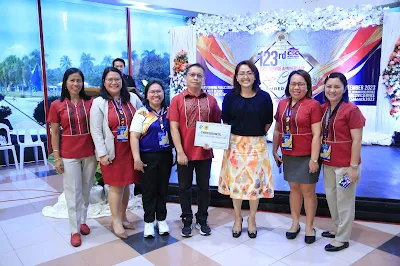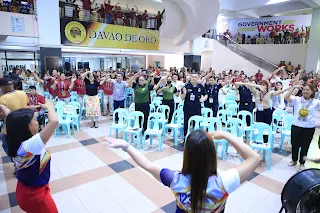By Lucell Larawan
In the heart of the Philippines lies a treasure trove of artistic brilliance, where creativity flows like Loboc river, painting the nation's cultural canvas with vibrant hues of imagination and ingenuity. From the visual arts hottest stars like Ronald Venura and Andres Barroquinto to Rodel Tapaya, Filipino artists have continued to push the boundaries of artistic expression in the modern era. However, amidst rapid societal development, the plight of mid-career artists often remains overlooked, stifling the growth of our artistic community. It is time to shine a spotlight on these talented creators and unveil the game-changing legislation that will empower and nurture their artistry, enriching our cultural heritage and driving forward our society.
The Link Between Artistic Development and Societal Progress
Art has long been regarded as a mirror reflecting society's hopes, dreams, and challenges. Its profound impact extends beyond aesthetics, encompassing the very essence of societal development. The value of art is not solely in its visual appeal but in its ability to ignite conversations, evoke emotions, and foster a sense of identity and unity.
A study conducted by the National Endowment for the Arts revealed that communities rich in artistic opportunities experience a wide array of benefits. These include increased civic engagement, reduced crime rates, enhanced educational outcomes, and a boost in local economies. Art, in all its forms, breathes life into the very essence of a community, making it more resilient and vibrant.
Filling the Gap: Democratizing Support for Artists
While the National Commission for Culture and the Arts (NCCA) plays a pivotal role in promoting and preserving Filipino arts and culture, the support it can provide to mid-career artists is often limited by the constraints of budget and resources. The proposed game-changing legislation seeks to address this gap by democratizing the ability to support artists. It encourages not just government agencies but also private institutions, individuals, and communities to actively participate in nurturing and uplifting mid-career artists.
Game-Changing Legislation for Mid-Career Art Careers
1) Mid-Career Art Grants Program: Recognizing the challenges faced by mid-career Filipino artists, the government introduces the Mid-Career Art Grants Program. This dedicated fund will provide financial support to these artists, empowering them to undertake ambitious projects and advance their craft. For instance, artists like Elena Santos, a talented painter in her mid-career, could receive a grant to create a series of thought-provoking murals exploring the themes of environmental conservation and social justice. With access to resources for art materials, research, workshops, and exhibitions, mid-career artists can embrace innovation and reimagine artistic boundaries.
Rationale: Many mid-career artists face financial constraints that hinder their ability to explore new avenues and elevate their craft. By offering grants, the government can empower artists like Elena Santos to experiment, innovate, and contribute significantly to the country's art scene.
2) Tax Incentives for Art Patronage: To foster a culture of appreciation for the arts and encourage private sector involvement, the government proposes tax incentives for individuals and corporations supporting mid-career artists through art purchases, sponsorships, or donations to cultural institutions. For example, a corporation that sponsors a mid-career artist like Juan Del Cruz’s solo exhibition could receive tax deductions, encouraging more businesses to invest in the arts.
Rationale: Encouraging patronage through tax incentives not only supports artists financially but also fosters a culture of appreciation for the arts in the broader community. It can lead to a more vibrant and sustainable ecosystem for art development.
3) Art Education and Mentorship Program: Acknowledging the transformative power of mentorship and education, the government initiates an Art Education and Mentorship Program. This program aims to connect mid-career artists with experienced professionals and mentors, providing them with workshops, training sessions, and networking opportunities. Through this structured support, artists can hone their skills, preserve artistic traditions, and embrace new techniques, fostering a vibrant and innovative art scene. For instance, a mid-career sculptor like Juan Dela Cruz could participate in a mentorship program with a renowned sculptor, learning new techniques and expanding her artistic horizons.
Rationale: By promoting a structured mentorship and education system, we can help mid-career artists refine their techniques, expand their horizons, and gain valuable insights from established artists. This fosters a sense of community and helps sustain artistic traditions while fostering innovation.
4) Public Art Commissions: Encourage government agencies, local governments, and private organizations to allocate a portion of their budgets for public art commissions. These commissions should prioritize mid-career Filipino artists, offering them opportunities to create public installations, sculptures, murals, and other artistic expressions in various public spaces. For example, a city council could commission a mid-career artist like Juan Dela Cruz to create a stunning sculpture for a public park, enriching the community's artistic experience.
Rationale: Public art not only enhances the visual appeal of communities but also serves as a platform for artists to showcase their talents to a broader audience. By involving mid-career artists in public art projects, we can increase their visibility and recognition while making art more accessible to the public.
The Impact: A Specific Example
Once these game-changing legislative ideas become laws, the impact on the artistic community can be monumental. One specific example of this impact is seen through the rise of an annual "Mid-Career Artists Festival," a celebration of artistic innovation and creativity that showcases the works of mid-career artists from various disciplines. This festival provides artists with a platform to engage with a wider audience, attract potential patrons, and collaborate with other creative minds. For instance, a mid-career filmmaker like Juan dela Cruz could screen his latest film during the festival, gaining exposure and recognition.
As a result, the festival becomes a cultural highlight, drawing both locals and international visitors to experience the richness and diversity of Filipino contemporary art. The success of the festival, fueled by the legislation's support, propels the mid-career artists' careers forward, creating a sustainable and vibrant artistic community.
Conclusion
The time has come to place mid-career Filipino artists on a pedestal, providing them with the support and resources they deserve to thrive and innovate. The proposed game-changing legislation aims to empower artists, enrich our cultural heritage, and drive societal progress. As we embrace these visionary reforms, we take a giant leap forward in shaping a brighter, more vibrant future for both the arts and the nation as a whole. Together, let us celebrate the power of art and ignite a new era of artistic excellence in the Philippines.





.png)

.webp)
.webp)

